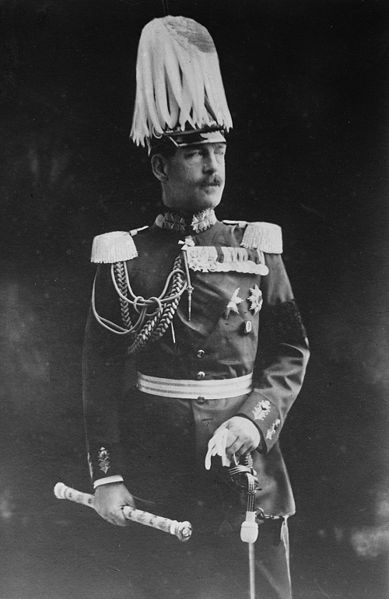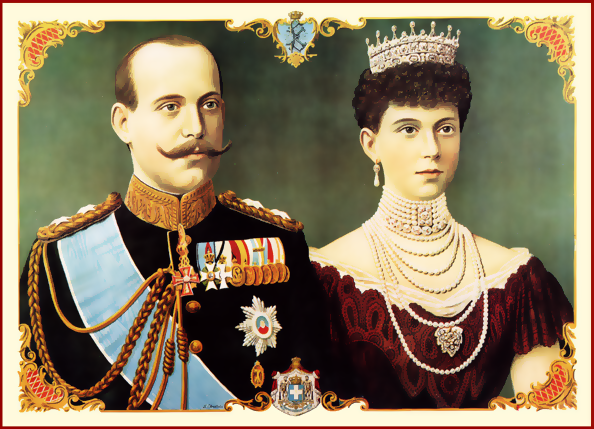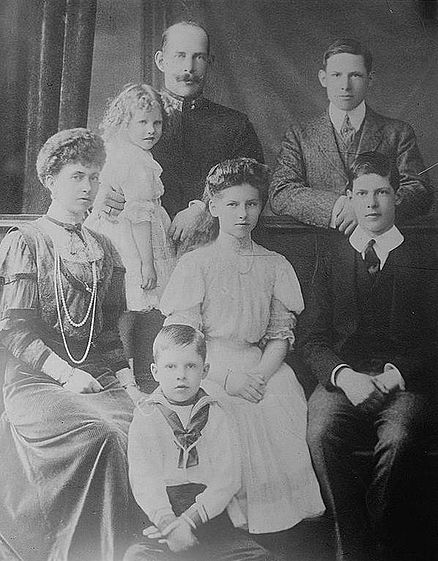<Back to Index>
- Physician Johann Jakob Scheuchzer, 1672
- Painter Samuel Dirksz van Hoogstraten, 1627
- King of the Hellenes Constantine I, 1868

Constantine I (Greek: Κωνσταντῖνος Αʹ, Βασιλεὺς τῶν Ἑλλήνων; 2 August [O.S. 21 July] 1868 – 11 January 1923) was King of the Hellenes from 1913 to 1917 and from 1920 to 1922. He was commander-in-chief of the Hellenic Army during the unsuccessful Greco-Turkish War of 1897 and led the Greek forces during the successful Balkan Wars of 1912-1913, in which Greece won Thessaloniki and doubled in area and population. He succeeded to the throne of Greece on 18 March 1913, following his father's assassination.
His disagreement with Eleftherios Venizelos over whether Greece should enter World War I led to the National Schism. Constantine forced Venizelos to resign twice, but in 1917 he abdicated, after threats of the Entente forces to bombard Athens; he left the Crown to his second son, Alexander. After Alexander's death, Venizelos' defeat in the 1920 legislative elections, and a plebiscite in favor of his return, Constantine reassumed his duties as King. Constantine abdicated the throne for the second and last time in 1922, when Greece lost the Greco-Turkish War of 1920-1922. He was succeeded by his eldest son, George II.
Born on 2 August 1868 in Athens, and baptized on 12 August, Constantine was the eldest son of King George I of Greece and Queen Olga.
Constantine was a direct descendant of five Greek imperial (Byzantine)
dynasties (Monomachos, Komnenos, Laskaris, Angelos, and Palaiologos), and in the vein of the Megali Idea, his name was deliberately chosen to evoke the glories of Byzantium. Upon his birth, he was conferred the title of Duke of Sparta.
This resulted in a heated dispute in parliament, since the constitution
did not allow any titles of nobility to be conferred to Greek citizens,
but the title was eventually accepted. The most prominent university
professors of the time were chosen to teach the young Crown Prince: Ioannis Pandazidis taught him Greek literature; Vassilios Lakonas mathematics and physics; and Constantine Paparrigopoulos history, infusing the young Crown Prince with the principles of the Megali Idea. On 30 October 1882 he enrolled in the Hellenic Military Academy. After completing the Academy's program, he was sent to Berlin for further military education, and served in the German Imperial Guard. Constantine also studied political science in Heidelberg and Leipzig. In 1890 he became Major General, and assumed the command of the 3rd headquarters of the Hellenic Army in Athens (3ο Αρχηγείο Στρατού). In January 1895, Constantine caused a political turmoil, when he ordered the army and gendarmerie forces
of Athens to break up a protest against the tax policy of the
government. Constantine had previously spoken to the crowd and advised
the citizens to submit their grievances to the government. Prime Minister Charilaos Trikoupis asked
the King to recommend to his son that he avoid such interventions in
the political life of the country without prior consultation with the
government. King George responded that the Crown Prince was just
fulfilling his military duties in dispersing the protesters, and that
his decision had no political importance. The incident caused a heated
debate in the Parliament, and Trikoupis finally resigned as a result. In the following elections Trikoupis was defeated, and the new Prime Minister, Theodoros Deligiannis,
regarded the incident as closed. He did not want to extend the
atmosphere of hostility between the government and the royal family. The organization of the first modern Olympics in
Athens was another issue which caused a Constantine-Trikoupis
confrontation with Trikoupis opposed to the government's holding the
games. After
Deligiannis' electoral victory over Trikoupis in 1895 those who favored
a revival of the Olympic games, including the Crown Prince, prevailed.
Subsequently, Constantine was instrumental in the organization of the 1896 Summer Olympics; according to Pierre de Coubertin,
in 1894 "the Crown Prince learned with great pleasure that the Games
will be inaugurated in Athens." Coubertin assured that "the King and
the Crown Prince will confer their patronage on the holding of these
games." Constantine later conferred more than that; he eagerly assumed
the presidency of the 1896 organizing committee. At the Crown Prince's request, wealthy businessman George Averoff agreed to pay for the restoration of the Panathinaiko Stadium, donating approximately one million drachmas.
Constantine was the commander-in-chief of the Greek Army in the Greco-Turkish War of 1897,
which ended in a humiliating defeat. In its aftermath, the popularity
of the monarchy fell, and calls were raised in the army for reforms and
the dismissal of the princes, and especially Constantine, from their
posts in the armed forces. The simmering dissent culminated in the Goudi coup in
August 1909. In its aftermath, Constantine and the princes were
dismissed from the armed forces, only to be reinstated a few months
later by the new Prime Minister, Eleftherios Venizelos, who was keen to gain the trust of King George. As General Inspector of the Army, Constantine again was appointed commander-in-chief of the Greek Army when the First Balkan War broke out in October 1912. He led the Army of Thessaly to victory at Sarantaporo. At this point, his first clash with Venizelos occurred, as Constantine desired to press north, towards Monastir,
where the bulk of the Ottoman army lay, and where the Greeks would meet
their Serb allies. Venizelos, on the other hand, demanded that the army
capture as soon as possible the strategic city of Thessaloniki, the capital of Macedonia,
to prevent its fall to the Bulgarians. The dispute resulted in a heated
exchange of letters, but Venizelos got his way: after again defeating
the Ottoman army at Giannitsa,
Constantine accepted the surrender of the city of Thessaloniki and of
its Ottoman garrison on 27 October (O.S.), less than 24 hours before
the arrival of a Bulgarian force. In the meantime, the operations in the Epirus front had stalled: against the rough terrain, and the Ottoman fortifications at Bizani,
the small Greek force could not make any headway. With operations in
Macedonia complete, Constantine transferred the bulk of his forces to
Epirus, and assumed their command. After lengthy preparations, the
Greeks broke through the Ottoman defences in the Battle of Bizani and captured Ioannina and most of Epirus up into what is today southern Albania (Northern Epirus). These victories dispelled the tarnish of the 1897 defeat, and raised Constantine to great popularity with the Greek people. At that point, tragedy struck: George I was killed in Thessaloniki by the anarchist Alexandros Schinas on
18 March 1913, and Constantine assumed the throne. In the meantime,
tensions between the Balkan allies grew, as Bulgaria claimed Greek and
Serbian-occupied territory. In May, Greece and Serbia concluded a
secret defensive alliance. On 16 June, the Bulgarian army attacked
their erstwhile allies, but were soon stopped. King Constantine again
led the Greek Army in its counterattack, in the battles of Kilkis-Lahanas and Kresna Gorge. Following their defeats and the intervention of the Ottomans and Romania, Bulgaria agreed to a ceasefire, leading to negotiations in Bucharest.
The victories in the second war gave a further boost to Constantine's
popularity, with him being widely acclaimed as "Bulgar-slayer", in
imitation of the Byzantine emperor Basil II. On the initiative of Prime Minister Venizelos, Constantine was also awarded the rank and baton of a Field Marshal. In
the aftermath of the victorious Balkan Wars, Greece was in a state of
euphoria. Her territory had been doubled, and under the dual leadership
of Constantine and Venizelos, her future seemed secured. This state of
affairs was not bound to last long, however. When World War I broke
out, Constantine was faced with the difficulty of determining where
Greece's support lay. Constantine's sympathies lay with Imperial Germany, but Venizelos was pro-Allied. In addition, Constantine understood that a maritime country like Greece could not antagonise the Entente Powers, who were the dominant naval power in the Mediterranean,
no matter where his personal sympathies lay. The king followed a policy
of neutrality in the war. Constantine's sympathies for Germany were
made manifest during the Allies' disastrous landing in Asia Minor at the Battle of Gallipoli.
Despite popular support of Venizelos amongst the people and his clear
majority in Parliament, Constantine opposed Venizelos's increasing
support for the Allies. When Bulgaria attacked Serbia, with whom Greece
had a treaty of alliance, Venizelos again urged the King to allow
Greece's entry into the war, and permitted Entente forces to disembark
at Thessaloniki in preparation for a common campaign over the king's
objections. After Constantine refused again to support Greece's entry
on the side of the Allies, however, Venizelos resigned, and Constantine
appointed Alexandros Zaimis in his place, at the head of a short-lived coalition government. In
July 1916, arsonists set fire to the forest surrounding the royal
palaces at Tatoi, in what was popularly seen as dissatisfaction with the
king's policy of neutrality. Although injured in the escape, the king
and his family managed to flee to safety. The flames spread quickly in
the dry summer heat, and sixteen people were killed. Although
the Greek government remained officially neutral despite the presence
of Allied troops in the second largest city, Thessaloniki, the Entente
commander, French General Maurice Sarrail,
declared martial law, effectively disbanding Greek authority in the
areas under Entente control. In turn, in May and August 1916, parts of
eastern Macedonia were allowed to be occupied, without opposition, by
the Bulgarians. Matters
came to a head in August 1916, when an Entente-supported Venizelist
revolt broke out in Thessaloniki. There, Venizelos established a provisional revolutionary government, which declared war on the Central Powers. With civil war apparently
imminent, Constantine sought from Germany firm promises of naval,
military and economic assistance - without success. Gradually, and with
allied support, Venizelos gained control of half the country -
significantly, most of the "New Lands" won during the Balkan Wars. This cemented the "National Schism",
a division of Greek society between Venizelists and anti-Venizelist
monarchists, which was to have repercussions in Greek politics until
past World War II. Early in 1917, General Sarrail ordered the royal Greek army to move from Thessaly to
the south of the country. He also ordered the Greek fleet to join the
Allies and finally, Sarrail ordered the Greek government to adopt a
more friendly attitude towards the Allies. In the face of the large
Allied army in Greece, King Constantine abdicated the throne in favour
of his second son Alexander in
June. The Allied Powers were opposed to Constantine's first son,
George, becoming King as he had served in the German army before the
war and was identified with his father's pro-German policies. Constantine
left Greece for exile in Switzerland on 11 June 1917. General Sarrail
was himself removed in November 1917 and replaced by a more diplomatic
French General. Constantine's
younger son, King Alexander, died on 25 October 1920, and the following
month Venizelos suffered a surprising defeat in a general election. Following a plebiscite, in which nearly 99% of votes were cast in favor of his return, Constantine
returned as king on 19 December 1920. This caused great dissatisfaction
not only to the newly liberated populations in Asia Minor, but also to
the Great Powers who opposed the return of Constantine. Within two years his new-found popularity was lost again. The ongoing Asia Minor Campaign against Turkey proved disastrous for the Greeks, as the Turks drove the Greek army from Anatolia and burned Smyrna. Following an army revolt, Constantine abdicated the throne again on 27 September 1922 and was succeeded by his eldest son, George II. He spent the rest of his life in exile in Italy and died in 1923 at Palermo, Sicily.

